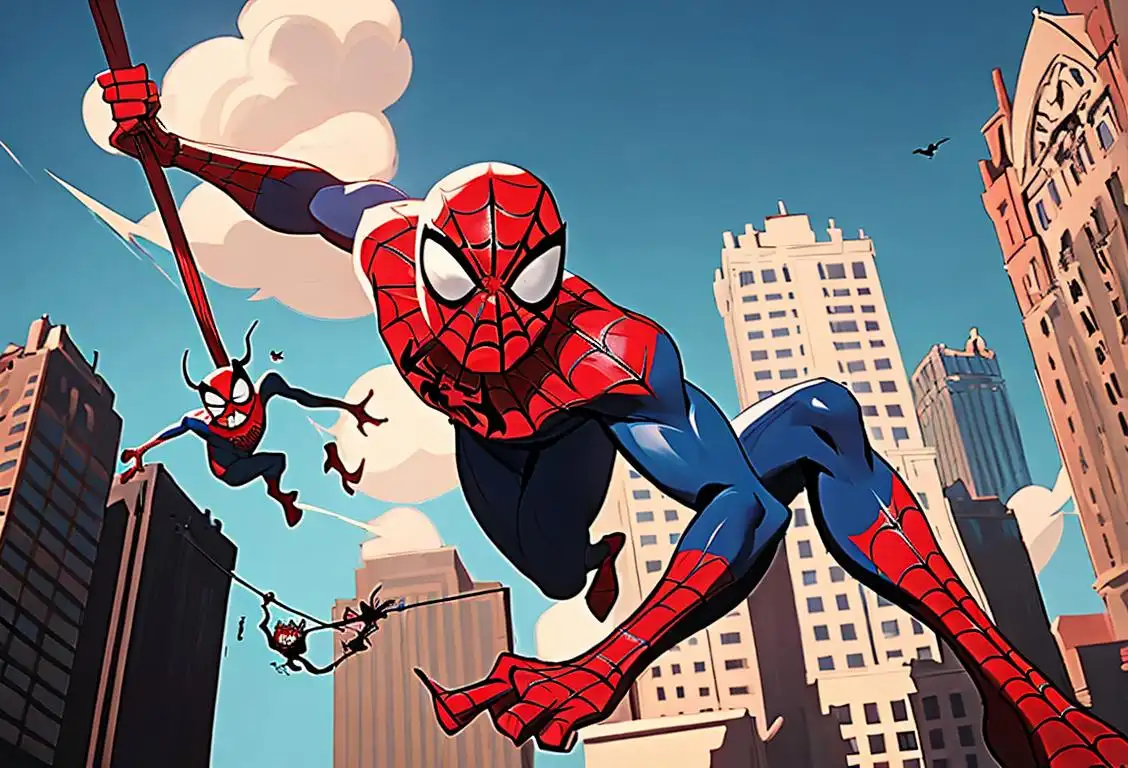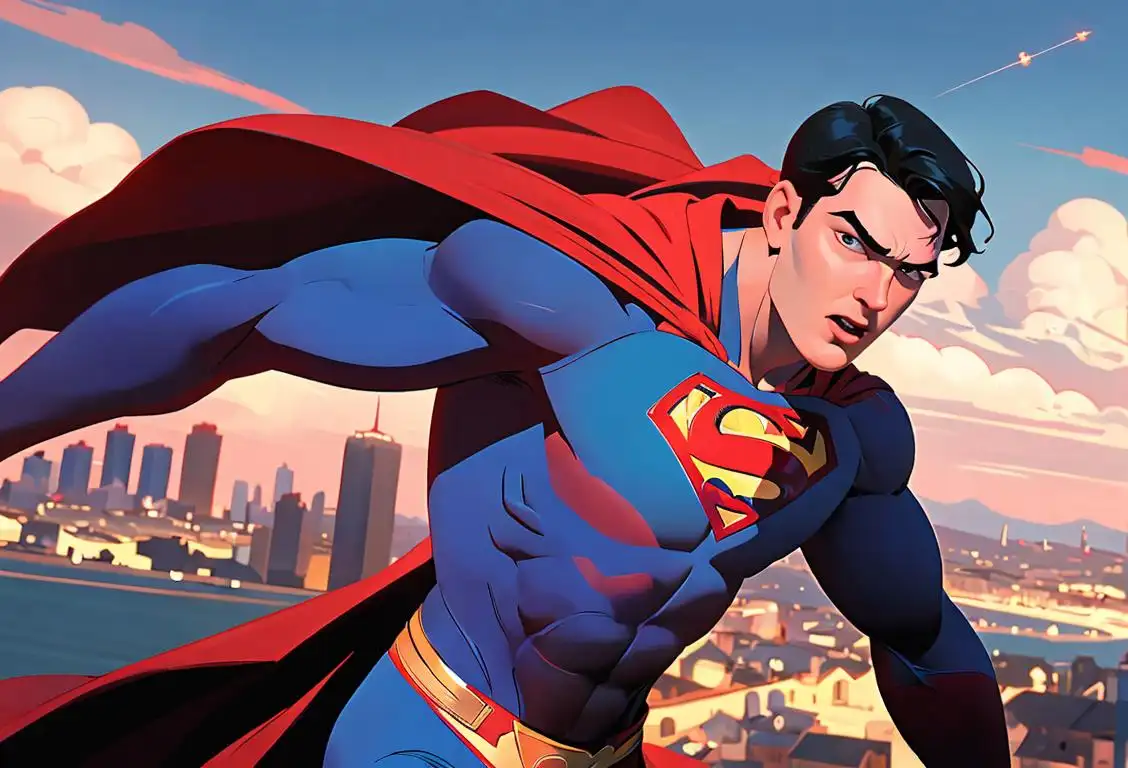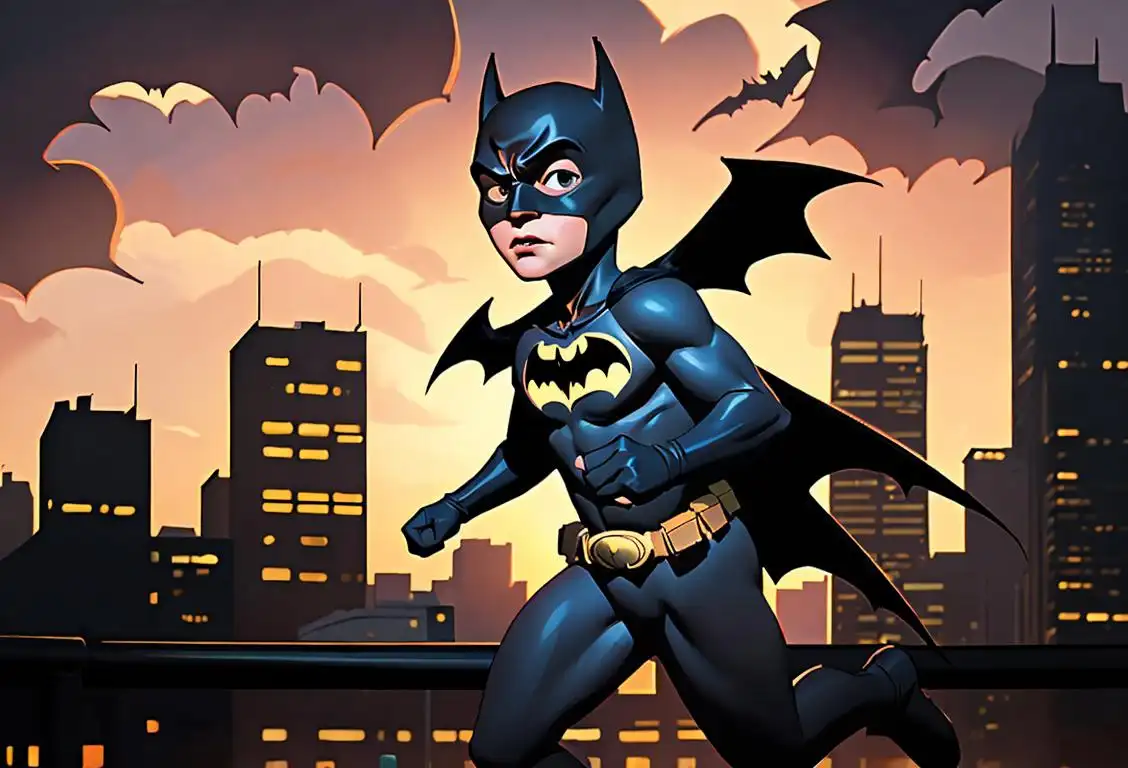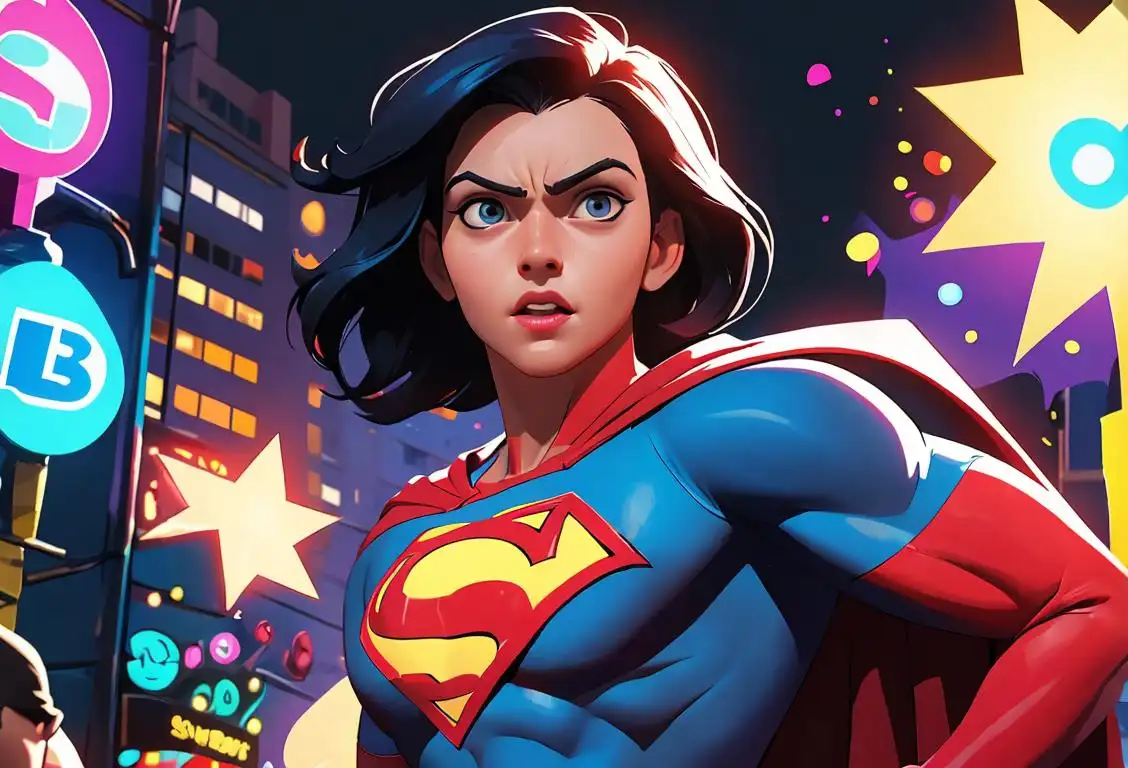National Spider Man Day

Greetings, web-slingers! It's time to celebrate National Spider-Man Day, a day dedicated to everyone's favorite friendly neighborhood superhero.
When is Spider Man Day?
It's national spider man day on the 1st August.
The Birth of Spider-Man Day
Every year on August 1st, fans of Spider-Man unite to honor the first appearance of this iconic Marvel character. Created by writer Stan Lee and artist Steve Ditko, Spider-Man made his debut in 'Amazing Fantasy' #15 back in 1962. Since then, he has swung into the hearts of millions of fans across the globe, earning a special day of recognition.
Spider-Man is not just a superhero; he is a symbol of hope, resilience, and the everyday heroism found within us all. From his witty one-liners to his iconic red and blue suit, Spider-Man has captured the imaginations of generations, inspiring both young and old to face their own personal villains and triumph over adversity.
How to Celebrate
There are countless ways to celebrate National Spider-Man Day. Here are a few suggestions:
- Organize a movie marathon and watch your favorite Spider-Man films. Whether you prefer the Tobey Maguire, Andrew Garfield, or Tom Holland portrayal, it's a perfect excuse to re-watch some spidey action.
- Dress up as your favorite Spider-Man character. Whether you choose to don the classic red and blue suit, opt for the black symbiote outfit, or even dress as one of Spider-Man's allies or villains, it's a fun way to channel your inner superhero.
- Create some Spider-Man-inspired artwork. Whether you're a talented illustrator or just enjoy doodling, get creative and draw your own web-slinging masterpiece.
The Impact of Spider-Man
Spider-Man has had a profound impact not only on the comic book industry but also on popular culture as a whole. His iconic presence has inspired countless adaptations, from animated TV shows to blockbuster movies and video games. With great power comes great responsibility, and Spider-Man has become a symbol of that timeless message.
So, get your spider-senses tingling and swing into action on National Spider-Man Day. Whether you're a die-hard fan or a newly initiated web-head, take a moment to appreciate the enduring legacy of everyone's favorite web-slinger.
History behind the term 'Spider Man'
1962
Introduction of Spider-Man in comics.
In 1962, the character Spider-Man was introduced in comic book form by writer Stan Lee and artist Steve Ditko. Spider-Man made his first appearance in issue #15 of Amazing Fantasy, which was titled 'The Amazing Spider-Man'. The character was created as a response to the increasing popularity and demand for superhero comics at the time.
1962
The Birth of Spider-Man
In 1962, Marvel Comics introduced the world to a new superhero named Spider-Man in issue #15 of 'Amazing Fantasy.' Created by writer Stan Lee and artist Steve Ditko, Spider-Man instantly captivated readers with his relatable character and unique powers. The story followed the high school student Peter Parker, who gains arachnid-like abilities after being bitten by a radioactive spider. This introduction marked the beginning of Spider-Man's journey into becoming one of the most beloved and enduring superheroes of all time.
1962
The Birth of Spider-Man
In 1962, Marvel Comics introduced Spider-Man as a comic book character. Created by writer Stan Lee and artist Steve Ditko, Spider-Man made his first appearance in Amazing Fantasy #15. The character, known for his incredible agility, web-slinging abilities, and iconic red and blue costume, quickly became a fan favorite.
1962
The Birth of Spider-Man
In 1962, the character of Spider-Man was created by writer Stan Lee and artist Steve Ditko. Spider-Man made his first appearance in the 15th issue of the comic book 'Amazing Fantasy' published by Marvel Comics. He was portrayed as a young high school student named Peter Parker, who gained superhuman abilities after being bitten by a radioactive spider.
1962
The birth of Spider-Man
In the year 1962, the character of Spider-Man was created by writer Stan Lee and artist Steve Ditko. Spider-Man made his first appearance in the comic book 'Amazing Fantasy #15' published by Marvel Comics. This marked the beginning of a beloved superhero who would capture the imaginations of millions worldwide.
1962
Creation of the character
In 1962, the term 'Spider-Man' was first introduced with the creation of the comic book character of the same name by writer Stan Lee and artist Steve Ditko. Spider-Man made his debut in issue #15 of 'Amazing Fantasy' published by Marvel Comics. The character quickly gained popularity due to his relatability as a nerdy high school student, Peter Parker, who gained spider-like superhuman abilities after being bitten by a radioactive spider.
1962
Creation of Spider-Man
In 1962, the term 'Spider-Man' was born when writer Stan Lee and artist Steve Ditko introduced the character in the comic book 'Amazing Fantasy #15.' Spider-Man, also known as Peter Parker, was a relatable teenage boy who gained superpowers after being bitten by a radioactive spider. This new superhero quickly became a fan favorite and paved the way for a cultural phenomenon.
2002
Spider-Man on the Big Screen
The year 2002 marked the release of the first Spider-Man film directed by Sam Raimi. Starring Tobey Maguire as the eponymous superhero, the movie was a massive success and introduced Spider-Man to a whole new generation of fans. The film's success paved the way for a trilogy and set the stage for future superhero franchises to come.
1967
Spider-Man swings onto TV screens
In the year 1967, Spider-Man made his first leap from comic books to the small screen with the premiere of the animated television series 'Spider-Man'. The show brought the adventures of the web-slinging hero to a broader audience and introduced his iconic theme song 'Spider-Man, Spider-Man, does whatever a spider can'.
2002
The blockbuster film
In 2002, the term 'Spider-Man' reached new heights of cultural significance with the release of the first Spider-Man film directed by Sam Raimi. Starring Tobey Maguire as Peter Parker/Spider-Man, the film became a box office success, grossing over $800 million worldwide. The film's success not only solidified Spider-Man's popularity among comic book fans but also introduced the character to a wider mainstream audience.
1963
Spider-Man Gets His Own Comic Series
Due to the incredible popularity of Spider-Man's introduction, Marvel Comics decided to launch a standalone comic series dedicated to the character. In 1963, 'The Amazing Spider-Man' #1 was published, marking the beginning of Spider-Man's independent adventures. The series quickly gained a dedicated fan base and became one of Marvel's flagship titles.
1967
Spider-Man Animated Series
The term 'Spider-Man' gained further popularity in 1967 when the first animated series titled 'Spider-Man' debuted on television. This animated series brought the web-slinging superhero to life, captivating audiences of all ages. It showcased Spider-Man's adventures and introduced him to a wider audience, solidifying his place in popular culture.
1967
The Spider-Man Animated Series
In 1967, the first Spider-Man animated series premiered. Produced by Grantray-Lawrence Animation, the series featured iconic narration and the catchy theme song, which is still recognized by fans today. This animated adaptation played a crucial role in further popularizing Spider-Man's character and expanding his reach beyond comic book readers.
1977
Spider-Man's first TV appearance.
In 1977, Spider-Man made his first live-action television appearance in 'The Amazing Spider-Man' series. The show aired for two seasons and starred Nicholas Hammond as Peter Parker/Spider-Man. This TV series helped to popularize the character further and introduced him to a wider audience.
2002
Spider-Man Film Franchise
The term 'Spider-Man' reached new heights of popularity in 2002 with the release of the first Spider-Man film directed by Sam Raimi. Starring Tobey Maguire as Peter Parker/Spider-Man, the film brought the beloved character to the big screen. The success of the film led to a successful franchise that further cemented Spider-Man's cultural impact and attracted millions of fans worldwide.
2010
Milestone in comic book history
In 2010, the term 'Spider-Man' marked a significant milestone in comic book history with the publication of 'Amazing Spider-Man' issue #648. This marked the beginning of a new era for the character as it featured a new creative team led by writer Dan Slott and artist Humberto Ramos, who brought fresh and exciting story arcs to the Spider-Man universe. The issue also introduced a redesigned costume for Spider-Man, signaling a new era for the beloved superhero.
1977
Spider-Man Swings into Television
In 1977, Spider-Man made his first live-action appearance on television with the 'Spider-Man' series, also known as 'The Amazing Spider-Man.' The show ran for two seasons and featured actor Nicholas Hammond as Peter Parker/Spider-Man. This marked the character's expansion from comic books to the realm of television, further increasing his exposure and popularity.
2002
Spider-Man's first major motion picture.
In 2002, the first major Spider-Man film was released, directed by Sam Raimi and starring Tobey Maguire as Peter Parker/Spider-Man. The film was a huge success and spawned two sequels, solidifying Spider-Man's status as one of the most beloved superheroes in popular culture.
2014
The Amazing Spider-Man
In 2014, a new era of Spider-Man began with the release of The Amazing Spider-Man, a reboot of the film franchise. Andrew Garfield took on the role of Peter Parker/Spider-Man, and the film delved into untold aspects of the character's backstory. The movie was followed by a sequel in 2014, further expanding Spider-Man's cinematic universe.
2002
Spider-Man Swings Onto the Big Screen
2002 marked the release of the first live-action Spider-Man film, directed by Sam Raimi and starring Tobey Maguire as Peter Parker/Spider-Man. The film's enormous success propelled the character to new heights of mainstream popularity and kick-started a wave of superhero movies in the 2000s. Spider-Man's transition to the big screen allowed a wider audience to experience the web-slinger's thrilling adventures in a cinematic format.
2002
The blockbuster success of Spider-Man movies
In the year 2002, Spider-Man swung his way into theaters with the release of the first Spider-Man movie directed by Sam Raimi. Starring Tobey Maguire as Peter Parker/Spider-Man, the film set the stage for a successful film franchise. The movie captivated audiences around the world and became the highest-grossing superhero film at that time.
2007
Spider-Man joins the Marvel Cinematic Universe.
In 2007, Marvel Studios and Sony Pictures Entertainment struck a deal to allow Spider-Man to join the Marvel Cinematic Universe. This partnership paved the way for Spider-Man's appearance in films such as 'Captain America: Civil War', 'Spider-Man: Homecoming', and subsequent Avengers films.
2018
Spider-Man in the Marvel Cinematic Universe
In 2018, Spider-Man's presence in popular culture was revitalized when the character became a part of the Marvel Cinematic Universe (MCU). Previously, due to licensing issues, Spider-Man was separate from the MCU. However, with an agreement between Sony Pictures and Marvel Studios, Spider-Man, portrayed by Tom Holland, appeared in MCU films like 'Captain America: Civil War,' 'Spider-Man: Homecoming,' and 'Avengers: Infinity War.' This collaboration brought Spider-Man closer to other beloved superheroes and delighted fans around the globe.
2018
Into the Spider-Verse
In 2018, the term 'Spider-Man' expanded its cultural impact with the release of the animated film 'Spider-Man: Into the Spider-Verse.' The film, directed by Bob Persichetti, Peter Ramsey, and Rodney Rothman, introduced audiences to a multiverse concept where multiple iterations of Spider-Man from different dimensions came together. This groundbreaking film received critical acclaim for its unique animation style, engaging storytelling, and diverse representation, establishing 'Spider-Man' as a franchise capable of transcending traditional superhero narratives.
2015
Spider-Man in the Marvel Cinematic Universe
One of the most significant developments in Spider-Man's history occurred in 2015 when Marvel Studios and Sony Pictures Entertainment struck a deal to bring the character into the Marvel Cinematic Universe. This meant that Spider-Man could finally appear alongside the likes of Iron Man, Captain America, and the Avengers in Marvel's blockbuster films. Tom Holland was cast as the new Spider-Man, and the character made his debut in Captain America: Civil War in 2016.
2002
Spider-Man Hits the Big Screen
In 2002, the first live-action Spider-Man film was released, directed by Sam Raimi and starring Tobey Maguire as Peter Parker/Spider-Man. The film was a massive success, both critically and commercially, and launched a highly successful film franchise. This marked a significant milestone for Spider-Man, as he became a household name and reached an even wider audience.
2012
The birth of the Spider-Verse
In the year 2012, the comic book storyline 'Spider-Verse' was introduced by writer Dan Slott and artist Olivier Coipel. This storyline brought together various versions of Spider-Man from different universes, showcasing the expansive scope of the character's mythos. 'Spider-Verse' became a fan-favorite event and laid the foundation for future Spider-Man crossover stories.
2018
Spider-Man in the Marvel Cinematic Universe
In 2018, after a complex series of rights negotiations, Spider-Man finally joined the Marvel Cinematic Universe (MCU). This collaboration between Sony Pictures and Marvel Studios allowed Tom Holland to portray the beloved character in the films 'Captain America: Civil War,' 'Spider-Man: Homecoming,' and subsequent MCU entries. Spider-Man's inclusion in the interconnected superhero universe sparked enthusiasm among fans and led to exciting crossovers with other iconic Marvel characters.
2012
The Amazing Spider-Man Reboot
In 2012, a reboot of the Spider-Man film series was released, titled 'The Amazing Spider-Man.' This film introduced actor Andrew Garfield as the new Peter Parker/Spider-Man. The reboot aimed to provide a fresh take on the character's origin story and received positive reviews. It continued to expand Spider-Man's presence in popular culture and set the stage for future films.
2021
New Adventures and Spin-Offs
As of 2021, Spider-Man continues to spin his web in various forms of media, including comics, animated series, and video games. The character has undergone exciting transformations, with new storylines, alternate universe versions (such as Miles Morales, Spider-Gwen, and Spider-Noir), and alliances with other heroes. Spider-Man's enduring popularity is a testament to his timeless appeal and ability to captivate audiences across different generations.
2018
Miles Morales swings into the spotlight
In the year 2018, the animated film 'Spider-Man: Into the Spider-Verse' was released, introducing audiences to a new version of Spider-Man. The movie featured Miles Morales as the main protagonist, a popular character from the comics who becomes Spider-Man in an alternate reality. The film received critical acclaim, becoming the first superhero movie to win the Academy Award for Best Animated Feature.
2018
Release of 'Spider-Man: Into the Spider-Verse'.
In 2018, the animated film 'Spider-Man: Into the Spider-Verse' was released. The film featured the character of Miles Morales, a biracial teenager who takes on the role of Spider-Man in an alternate universe. The groundbreaking film was critically acclaimed and won the Academy Award for Best Animated Feature.
2018
Spider-Man: Into the Spider-Verse
In 2018, Spider-Man ventured into the world of animated films with the release of Spider-Man: Into the Spider-Verse. This groundbreaking film introduced audiences to the concept of multiple Spider-Men from different dimensions coming together to save the day. Not only did the movie earn critical acclaim, but it also won the Academy Award for Best Animated Feature, solidifying Spider-Man's place among the most iconic superheroes in popular culture.
2021
Spider-Man: No Way Home
The term 'Spider-Man' continues to captivate audiences with the highly anticipated release of 'Spider-Man: No Way Home' in 2021. This film features a multiverse storyline, bringing together different versions of Spider-Man from different universes. It promises to be a groundbreaking cinematic event, further solidifying Spider-Man's enduring popularity and cultural significance.
2018
Spider-Man Joins the Marvel Cinematic Universe
After years of fans eagerly waiting, Spider-Man finally joined the Marvel Cinematic Universe (MCU) in 2018. This collaboration between Sony Pictures, who holds the film rights to Spider-Man, and Marvel Studios allowed the character to appear in MCU films such as 'Captain America: Civil War,' 'Spider-Man: Homecoming,' and 'Spider-Man: Far From Home.' This integration delighted fans and showcased Spider-Man interacting with other beloved Marvel superheroes.
2021
Expansion of the Spider-Man franchise.
In 2021, the Spider-Man franchise continues to expand with new films, TV series, and merchandise. The character has become an iconic symbol of heroism and has resonated with audiences of all ages around the world. Spider-Man's enduring popularity is a testament to the timeless appeal of this friendly neighborhood superhero.
Did you know?
Did you know that Spider-Man's first appearance almost didn't happen? Stan Lee introduced the character as a backup feature in 'Amazing Fantasy' #15, the final issue of the series. But the overwhelmingly positive response from readers led to Spider-Man getting his own comic series and becoming the iconic superhero he is today!Tagged
fun pop culture superheroFirst identified
1st August 2018Most mentioned on
1st August 2018Total mentions
13Other days
Spider Man Day
Superman Day
Avril Lavigne Appreciation Day
Mean Girls Day
Rubber Ducky Day
Batman Day
Star Wars Day
Super Hero Day
Talk Like A Pirate Day
Jennifer Aniston Meme Day








